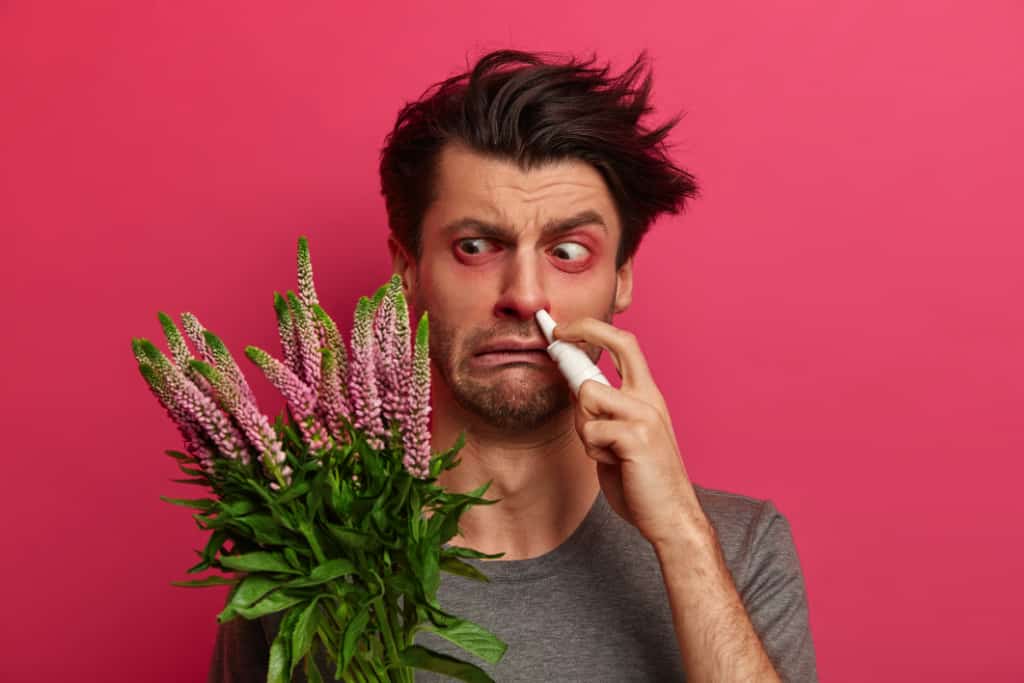Sufferers of hay fever know that there is no cure for this affliction. However, with the right treatment plan, hay fever can be managed. There are a variety of over-the-counter medications and home remedies available to treat this allergy symptom.
Allergic Rhinitis – A Miserable Experience
The symptoms of hay fever can include sneezing, runny nose, itchy eyes and a sore throat. A common misconception is that if you don’t get a stuffy nose with your hay fever then it’s not real. This is not true! Hay fever also known as allergic rhinitis occurs when your immune system reacts to certain allergens in the air. The most common cause of this reaction is pollen but some people can also be allergic to mould or animal fur.
The allergens that cause the reaction vary depending on where you live and what allergies you have. People who work indoors won’t usually be affected by pollen because it comes from plants outdoors like trees and grasses. But if you have an allergy to dust mites (found in mattresses) or cat dander (the dead skin flakes from cats), then those allergens can affect anyone no matter where they are located – inside or outside!
- First things first: do your research!
If you have no idea what’s causing your hay fever symptoms or how they’re affecting your life, then it’s time to do some detective work before making any changes to your routine or diet. Start by taking note of when these symptoms occur and which allergens seem most likely associated with them (you can use an app like Pollen app, Hayfever . Which is also an allergy tracker).
- Identify where the problem areas are located – indoor vs outdoor sources?

Over-The-Counter Medication for Hay Fever
If you’re looking to ease your symptoms quickly, there are a few options available. Antihistamines and decongestants can be bought without a prescription, and eye drops or nasal sprays are also commonly recommended.
Clarityn is an antihistamine that takes effect within 30 minutes of taking it. It’s available in tablet form and as a liquid, but it should not be used by those under the age of 12 or who have asthma or any other respiratory conditions. Side effects may include drowsiness and dry mouth, so don’t take this if you need to drive a vehicle after taking it.
Zirtek contains cetirizine hydrochloride as its active ingredient; this works by blocking the histamine receptors in your body that cause inflammation and itching when exposed to allergens like pollen. You’ll find Zirtek in both tablet form (10mg) and liquid form (10mg/5ml). Be sure to follow dosage instructions carefully—taking too much may lead to side effects like blurred vision or dizziness!
Benadryl is another common over-the-counter option for relief from allergy symptoms; however, because it has sedative properties (it’s often used as part of sleep therapy), we suggest talking with your doctor before taking this medication if you have any underlying conditions such as diabetes mellitus type 2 – blood sugar control problems; glaucoma – increased pressure inside the eye); high blood pressure – fluid around the heart); heart disease – narrowing arteries supplying blood flow); muscle weakness due to myasthenia gravis – an autoimmune disorder affecting nerves leading muscles).
Use of Antihistamines
Antihistamines block the chemical histamine in the body, which is a natural part of the body’s immune response to an allergen. When you take an antihistamine, it blocks or lessens your body’s reaction to the allergic trigger by stopping histamine from binding to its receptor cells. Histamines are released during allergic reactions and can cause symptoms such as sneezing and itching.
Antihistamines can be found over-the-counter (OTC) in many forms such as tablets or syrups that you take orally; they also come in creams and eye drops that are applied topically (on your skin).
Antihistamines may make you feel drowsy because they interfere with sleep cycles; if this happens to you when taking an antihistamine for hay fever treatment, try taking it at bedtime instead of mid-afternoon so that you don’t fall asleep while driving home from work!
Using Decongestants To Unblock Stuffy Noses
Decongestants are medications that shrink the swollen membranes in your nose. They can be purchased over the counter and may help you breathe easier if you have a stuffy nose. You should treat symptoms of hay fever with both antihistamines and decongestants as a way to relieve symptoms and reduce inflammation.
Decongestants work by reducing swelling in the lining of your nose, which helps with nasal congestion.
When buying a decongestant to combat hay fever it’s best to opt for one that contains pseudoephedrine (e.g., Sudafed) as this ingredient has been shown to be effective at reducing stuffiness, sneezing and itching associated with hayfever when taken alongside an antihistamine.
Natural Hay Fever Treatment & Remedies
Hay fever is an allergic reaction to tree, grass and weed pollen. It causes sneezing, runny nose and itchy eyes. The symptoms of hay fever can be really annoying and uncomfortable, so it’s important that you find a treatment that works for you.
There are lots of different treatments available for hay fever but natural remedies are less likely to have side effects than modern medicine. Natural remedies can also be used alongside conventional medicine so if your doctor recommends some medications for your hay fever this won’t stop you from trying out some alternative treatments too.
Natural remedies can be used preventatively – by taking them before the pollen season starts – as well as during the season when your symptoms are at their worst or just before bedtime each night (to help you get a good sleep).
At Home Hay Fever Remedies
Eat a healthy diet. Eating a balanced diet is of the utmost importance to your overall health, and it can also help you feel better during hay fever season.
Drink plenty of water. Dehydration is one of the most common symptoms of hay fever, so staying hydrated by drinking at least eight glasses a day will ensure that your body stays strong and healthy throughout the season.
Exercise regularly. Regular exercise can help your body fight off infections in many ways, including boosting immune system function and reducing stress levels that may cause you to react more strongly to allergens in the air around you.
Get plenty of sleep every night! Hay fever usually begins with sniffling and sneezing after being outdoors for too long on hot days; getting enough shut-eye might actually prevent those symptoms before they start!

Dust vs Hay Fever
Dust is the main cause of hay fever. It’s also the most common allergen that causes hay fever and other allergic reactions, like asthma. In fact, dust causes more than 50% of all allergies!
It’s not just an irritant—it can cause your eyes to water and your nose to run. Dust mites are microscopic bugs that live in carpets, curtains and mattresses around homes (and even on people!). They release proteins that trigger allergic reactions when they come into contact with your body through skin contact or inhalation.
Conclusion
Hay fever affects millions of people and can be a miserable experience. There are many over-the-counter medicines for hay fever, you just need to figure out which one works best for you. You can also do some things at home to help treat your hay fever symptoms, such as using nasal rinses or saline sprays.
If hay fever becomes unbearable, your GP with referring you for immunotherapy. During this process, you’ll be given an injection that contains a small amount of pollen or a tablet that will help boost and build up your immunity to pollen.
It’s important to identify this earlier on as the NHS recommend that the immunotherapy should happen at least 3 months before hay fever season begins (Spring).
Just with most conditions or diseases, you may start to experience symptoms which may lead you to believe that you have hay fever. In this list below, you’ll find the possible symptoms that can help you diagnose whether you have hay fever or other underlying allergy conditions.
– Watery and itchy eyes
– Itchy mouth
– Irritated throat
– A tickly nose that leads to excessive sneezing, resulting in flared nostrils
– Pain around your forehead
If you are experiencing the above symptoms and are not sure what to do, please contact your GP or your local pharmacy for more advice.
Often hay fever is described like it is a cold. It can be difficult making a distinction between the two. However, the list of symptoms above can help clarify whether you have a cold or hay fever.
The longevity of hay fever depends from person to person. Some people have it short term and others experience hay fever for a few months. It’s needless to say that if you have previously experienced hay fever before that you start taking the necessary precautions as we approach the spring and summer seasons.
This is a personal tip and as someone who has suffered from hay fever for a long time, a lot of water is required to stay hydrated. I personally enjoy drinking warm water and find that it’s effective as an allergy treatment. I used to experience hay fever and dust allergies. Having tried a countless number of remedies from face masks, tablets, and face steamers and the list will literally not end, I found that drinking a lot of warm water during my day helps me fight through it. This spring and summer, I’ve been allergy-free.
It’s important to note that this is not the case for everyone so do not rely on this as your sole remedy. Our bodies behave differently to treatments and what works for one may not work for all.


